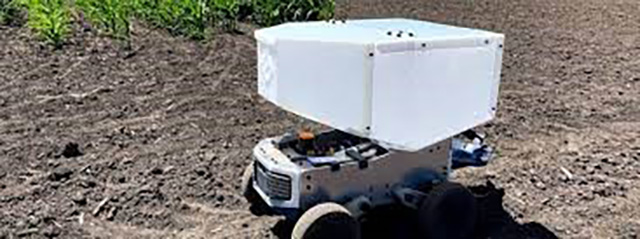The movie I, Robot came out in 2004, telling the story of a society in which a population of highly intelligent robots that worked public service positions to keep people safe became part of a dangerous conspiracy to enslave the human race. This fantastical, futuristic robot theme is one that was quite popular throughout the early 2000’s. While watching movie star Will Smith conquer a dangerous robot regime on the big screen, it may have been difficult to imagine the ways in which robotics could be a realistic and helpful addition to society in the near future.
Today, robots regularly roam a plot of farmland in Urbana, Illinois. This plot of farmland is used by the Artificial Intelligence for Future Agricultural Resilience, Management, and Sustainability (AIFARMS) Institute. AIFARMS brings together researchers studying both artificial intelligence and agriculture. Core research areas at AIFARMS include computer vision, data science, machine learning and human-robot interactions. Their mission is to use these areas of research to address major challenges in agriculture, and fulfill important societal needs.
“Current agriculture production relies on unstainable labor needs, soil degeneration, herbicide/pesticide resistance, nitrogen runoff, greenhouse gas emissions, and animal welfare concerns,” says Jessica Wedow, AIFARMS executive director. “These critical challenges are difficult to tackle with human capacity and conventional technologies alone.”
Currently, AIFARMS is working on four different research projects. One of these projects involves the design and development of an AI-driven farm. The purpose of this project would be to alleviate the agricultural labor crisis and encourage sustainable crop management practices using teams of small, intelligent robots called agbots.
The US agriculture industry has faced widespread farmworker shortage over the years, due to dwindling rural populations and declining interest in agricultural employment. Farmers have been forced to find innovative ways to adapt, such as the implementation of agricultural technology. With the AIFARMS agbots, tedious agricultural duties like harvesting and scouting fields no longer need to be performed by farmworkers and can be fulfilled by the robots instead.
Sustainable crop management practices are also a major plus of the AIFARMS research projects. With a growing population and limited land and water, increasing the efficiency of the farming industry has been a very important societal goal. By using AI-driven farming techniques, the need for unsustainable standard farming practices decreases. For example, farmers can use agbots to weed plants beneath the crop canopy, instead of applying herbicides that are harmful to the environment.
In addition to different research projects, AIFARMS hosts a variety of education and outreach programs. These programs contribute to meaningful efforts to inspire the younger generation to explore digital agriculture and grow a skilled workforce.
As the agricultural community faces new challenges due to a fluctuating climate and growing global population, research within digital agriculture is becoming an increasingly important part of the solution.
Get Involved
Interested in learning more about this work? The AIFARMS annual conference will be held on September 7, 2023, in Urbana, Illinois, at the National Center for Supercomputing Applications (NCSA).
Additionally, the Center for Digital Agriculture at the University of Illinois at Urbana-Champaign, Center for Research on Programmable Plant Systems (CROPPS), and PhenoRob are organizing a full-day “Workshop on Agricultural Robotics for a Sustainable Future” at the IEEE/RSJ International Conference on Intelligent Robotics and Systems (IROS) 2023. This workshop will take place on October 1, 2023, from 9:00 a.m.–5:00 p.m. ET, in Detroit, Michigan. Researchers working in different areas of Agricultural Robotics and Precision Agriculture are invited to submit their work as abstracts to be considered for poster presentations and lightning talks.
Contact the Midwest Big Data Innovation Hub if you’re aware of other agriculture- or food-related people or projects we should profile here, or to participate in any of our community-led Priority Areas. The MBDH has a variety of ways to get involved with our community and activities.
The Midwest Big Data Innovation Hub is an NSF-funded partnership of the University of Illinois at Urbana-Champaign, Indiana University, Iowa State University, the University of Michigan, the University of Minnesota, and the University of North Dakota, and is focused on developing collaborations in the 12-state Midwest region. Learn more about the national NSF Big Data Hubs community.

